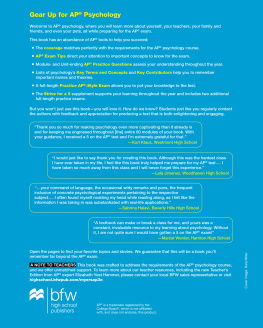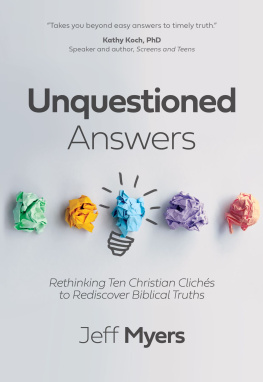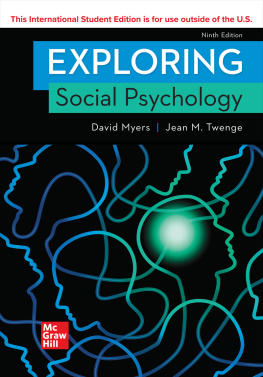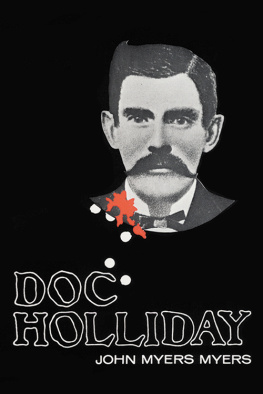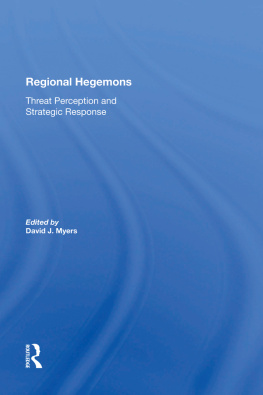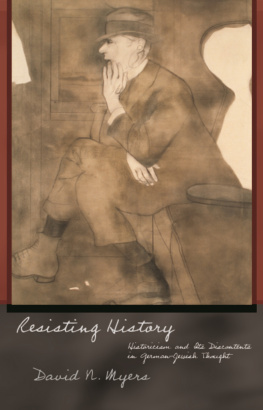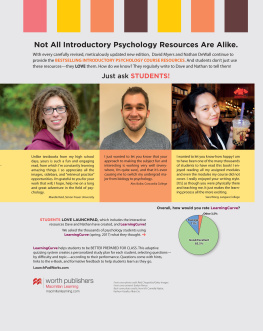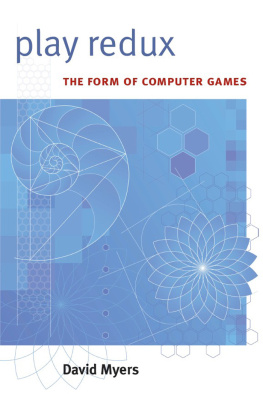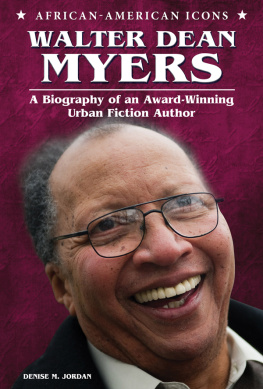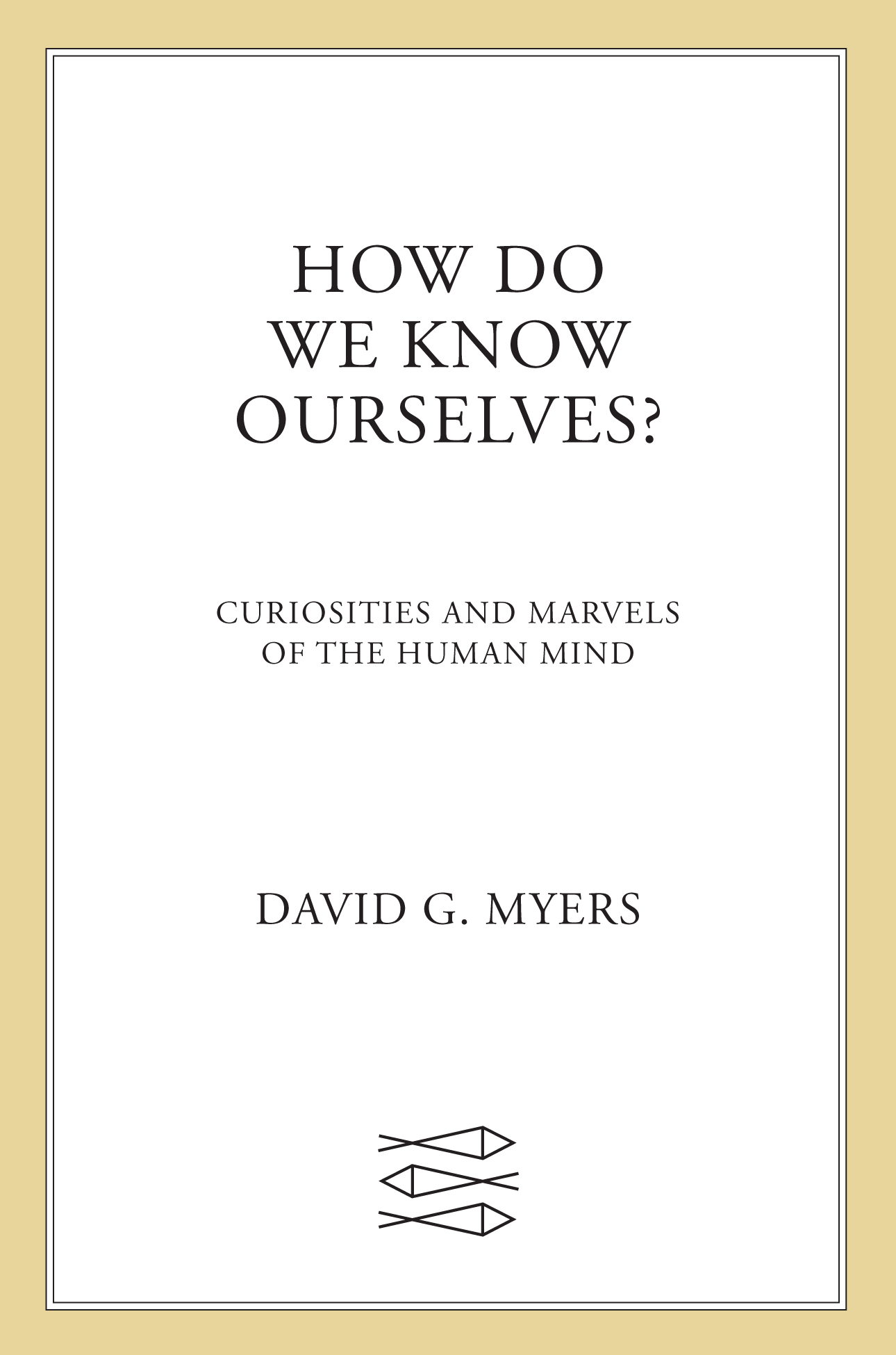Contents
Guide
Pagebreaks of the print version

The author and publisher have provided this e-book to you for your personal use only. You may not make this e-book publicly available in any way. Copyright infringement is against the law. If you believe the copy of this e-book you are reading infringes on the authors copyright, please notify the publisher at: us.macmillanusa.com/piracy.
For Carol,
my companion on the journey of life
As a researcher and professor of psychological science, I am animated by two aims: to enable people, amid a sea of misinformation, to think smarter about their lives, and to help them savor the wonders within and around us.
Ive been privileged to pursue these aims over five decades by teaching and by writing textbooks for psychology students worldwide. I am fortunate to be charged with harvesting the first fruits of my discipline, to file new research in my office cubbyholes nearly every day, and then to distill and give away the newsworthy insights.
Reading my disciplines discoveries leaves me sometimes surprised, occasionally awestruck, and frequently fascinated by the human mind. Often I encounter some new discovery or insight and think, This is something educated people need to know! Over the years Ive written in-depth books for general readers on topics ranging from the scientific pursuit of happiness to the powers (and perils) of intuition. Here I instead share a wide-ranging assortment of psychological science findings.
Some of the musings that follow were sparked by new research that illuminates some facet of our lives. Others occurred spontaneously as I witnessed human events and saw a psychological science explanation. Thus were born these reflections on the marvels of our minds. Some appear here for the first time; many are adapted from musings originally published on my Talk Psych Blog.
The essays appear in three clusters: Who Am I? (focusing on the self); Who Are We? (exploring our relationships); and What in the World? (taking a psychological eye to the larger world around us).
I offer this book hoping that youor someone you knowmight enjoy these short and sometimes playful glimpses of psychologys wisdom. Or perhaps, having already studied psychology, you might welcome a recap and an update of its mind-expanding offerings.
The essays all aim to shine the light of psychological science on our sometimes bewildering and ever-fascinating lives. Each has a simple premise: although we all know a lot, we dont know what we dont knoweven about ourselves.
You surely know why you chose your town, your partner, and your vocationall for good reasons, no doubt.
But might other, unknown reasonsoperating beneath your awarenessalso have nudged your choices? This is the implication of implicit egotisman automatic tendency to like things we associate with ourselves. For example, we come to like familiar things, including our own familiar face. Thus, we prefer a politician or stranger who looks like usindeed, whose face has been morphed with some features of our own.
We also find someone more attractive when our face has been morphed with theirs. Facial resemblance is a cue of kinship, noted the University of Glasgow researcher Lisa DeBruine, who earlier had also found more trust of people with self-resembling same-sex faces. I can relate, having once been conned out of $20 by a seemingly desperate person seeking a taxi fare who I later reflected looked rather like me. Implicit biases operate behind the scenes.
I see you yawning: You needed research to know that we love ourselves and things that resemble us? The surprise comes with the many ways this phenomenon has been documented.
One example is the name-letter effect. People of varied nationalities, languages, and ages prefer the letters that appear in their own name. People also tend to marry someone whose first or last name resembles their own.
A second is the birth datenumber effect. People likewise prefer the numbers that appear in their birth date. In one experiment, people, after having their self-concept challenged by briefly thinking about their weaknesses, were more attracted than usual to other people whose laboratory participant number (such as 1122) resembled their own birth date.
Or consider the name-residence effect. Philadelphia, having many more people than Jacksonville, has had (no surprise) 2.2 times more men named Jack but also 10.4 times more named Philip. Ditto Virginia Beach, which has a disproportionate number of women named Virginia, and St. Louis, which, compared with the national average, has 49 percent more men named Louis. Likewise, folks named Park, Hill, Beach, Rock, or Lake are disproportionately likely to live in cities (for example, Park City) that include their surnames.
If that last findingoffered by the social psychologist Brett Pelham and his colleaguesdoesnt surprise you, consider an even weirder phenomenon they uncovered: people seem to gravitate to careers identified with their names. In the United States, Dennis, Jerry, and Walter have been equally popular names. But dentists have twice as often been named Dennis as Jerry or Walter, and two and a half times more often named Denise than the equally popular Beverly or Tammy. Among geoscientists (geologists, geophysicists, and geochemists), people named George and Geoffrey are similarly overrepresented.
The phenomenon extends to surname-occupation matching. In 1940 U.S. Census data, people named Baker, Barber, Butcher, and Butler (and seven other occupations that double as names) were all more likely than expectedsometimes much more likelyto work in occupations associated with their names.
Ah, but do Pelham and his colleagues have cause and effect reversed? Uri Simonsohn, a behavioral scientist with a knack for exposing questionable findings, has argued exactly that. For example, arent towns and streets often named after people whose descendants stick around? And are people in Virginia more likely to name girls with the state name? Are Georgians more likely to christen their babies Georgia or George? Wasnt the long-ago village bakerthus so namedlikely to have descendants carrying on the ancestral work?
Likely so, grants Pelham. But could that, he asks, explain why states have an excess of people sharing a last-name similarity? California, for example, has an excess of people whose names begin with Cali (as in Califano). Moreover, he reports, people are more likely to move to states and cities with name resemblancesVirginia to Virginia and Tex to Texas, for example.
I thought of this playful surname-occupation research when reading a paper on the cognition of black bears, co-authored by Michael Beran. Next up in my reading pile was creative work on problem-solving by crows, led by Chris Bird. Soon after, I was reading about interventions for lifting youth out of depression, pioneered by Sally Merry.
That took my delighted mind to the important books on animal behavior by Robin Fox and Lionel Tiger, and to the Birds of North America volume by Chandler Robbins.
The list goes on: the billionaire Marc Rich, the drummer Billy Drummond, Ronald Reagans White House spokesman Larry Speakes.
Internet sources offer lots more: dentists named E. Z. Filler, Gargle, and Toothaker; the Oregon banking firm led by Cheatham and Steele; and the chorister Justin Tune. But as an internet meme reminds us, The problem with quotes on the Internet is that you never know if theyre true (Abraham Lincoln).


